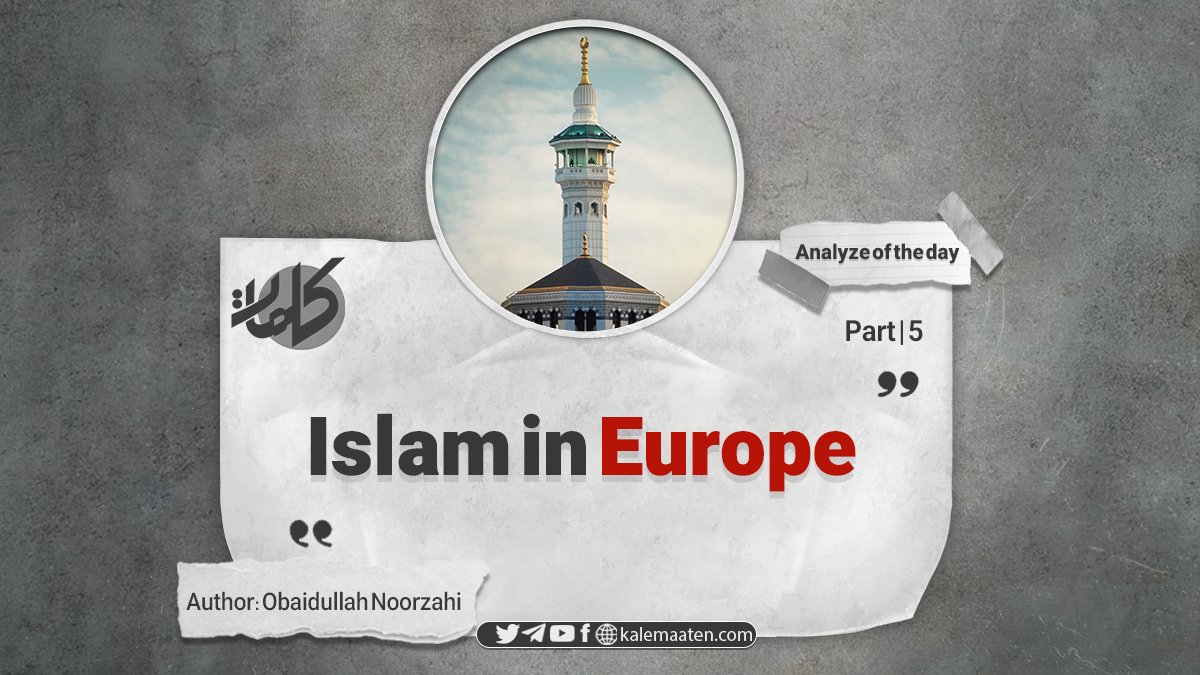
Author: Obaidullah Noorzahi
Islam in Europe (Part Five)
In this section, we analyze the struggle of Europeans against Islam and Muslims from two perspectives: political and cultural.
A. Political and Military Activities
Europeans continued their struggle against Islam and Muslims on a wide scale in the political and military spheres:
1. The Christian Russian War with the Ottomans:
Between 1762 and 1796, during the reign of Catherine the Great, Christian Russia launched a fierce war against the Ottoman Empire. As a result, regions such as Azov, the Crimean Peninsula, and the northern areas of the Black Sea were seized by Russia. Additionally, Turkestan was separated from Ottoman territory.
2. Napoleon’s Invasion of Egypt:
In 1798, Napoleon invaded Egypt, bringing this Islamic land under his control.
3. Colonization of North Africa:
France occupied Algeria in 1830, Tunisia in 1881, and Morocco in 1912, subjecting these regions to colonial rule.
4. British Domination over India and Arab Regions:
England curtailed Muslim influence in India and, in 1839, took control of Aden, as well as the southern and eastern parts of Arabia. Furthermore, it occupied Egypt and Sudan in 1882 and 1898, respectively.
5. Incitement of Balkan Nations:
European countries incited the nations of the Balkan Peninsula and, through the division of this strategic region, weakened the Ottoman Empire. In 1830, Greece gained independence from Turkey.
6. Partitioning of Islamic Lands after World War I:
During World War I, Europeans involved the Ottoman Empire in the conflict. After its defeat, they dismantled this Islamic power through calculated conspiracies, dividing Islamic lands among themselves. For instance, France separated Lebanon from Syria and established a special regime led by a Christian ruler. The roots of Lebanon’s current instability can be traced to this colonial scheme.
B. Propaganda and Cultural Programs
The West used its powerful propaganda apparatus to wage a cultural war against Islam through several strategies:
1. Weakening Muslims’ Connection to Religious Values:
By isolating Muslims from Islamic teachings, spirituality, and self-confidence, they were turned into weak, submissive individuals addicted to a culture of domination.
2. Undermining Religious Beliefs:
Islamic beliefs were distorted and introduced in corrupted forms, creating skepticism towards religion. This policy, often framed under slogans like “civilization” and “modernity,” especially among young Muslims, weakened their religious identity.
3. Sowing Ethnic and Linguistic Divisions:
By promoting ethnic and tribal issues against religious unity, the Arabic language (the language of the Quran) was weakened, and European languages were made official in Islamic countries. Additionally, the concept of separating religion from politics was propagated to prevent Muslims from engaging in political movements.
4. Influence in International Forums:
The West employed double standards in global issues, aggressively promoting human rights whenever its interests were at risk while accusing Islamic countries of violating human rights on baseless grounds.
5. Promoting Consumerism and Corruption:
The spread of immorality and the destabilization of family structures have led to profound crises in Islamic societies. This cultural onslaught has replaced Islamic values with Western cultural practices.
The Islamic world must create a cohesive and resilient front to counter these cultural and moral invasions by the West. A cultural struggle, more significant than political and military battles, can prevent the continued dominance of the West and the spread of its decadent imported values.
Overview of Europe’s Geography
A) Size and Geographical Position:
Europe, with an area of 10,461,000 square kilometers, is the second smallest continent after Oceania. Entirely located in the Northern Hemisphere and the temperate northern zone, it lies between 35° and 71° north latitude. Europe is essentially a peninsula extending from Asia into the seas and oceans, with the longest coastline-to-land ratio among continents.
B) Natural and Economic Features:
Europe’s oceanic climate and proximity to seas place it in a unique natural and economic position. Rivers, especially the Danube, which is 2,960 kilometers long and drains an area of 820,000 square kilometers, have played a fundamental role in the formation of European civilizations.
C) Geographical and Climatic Divisions:
Europe is divided into four regions based on terrain:
1. Central Highlands
2. Southern Alpine Mountains
3. Western Highlands
4. Northern Lowland Plains
Europe’s climate is categorized into three types:
1. Oceanic Climate: Found in western coastal areas, influenced by westerly winds and the Gulf Stream.
2. Humid Continental Climate: Prevailing in central and interior regions.
3. Mediterranean Climate: Found in southern areas near the Mediterranean Sea.
Human Settlement and Civilization Formation:
Europe has been inhabited since the late Pleistocene, following the retreat of glaciers. Southern regions, particularly Greece, have historically been significant centers of human civilization.
The Roman Empire, at its peak in the 2nd century AD, was the first major political entity in Europe. It stretched from northern England to the Black Sea and the Persian Gulf.
Modern Europe began its progress in the late 15th century, following the Dark Ages, influenced by Islamic culture. Geographical explorations led to the discovery of Asian and African territories, enabling the plunder of wealth and the exploitation of local populations.
The Industrial Revolution, driven by James Watt’s invention of the steam engine (1765–1788), accelerated urbanization and industrialization, increasing Europe’s reliance on resources from other countries.
Population and Social Features:
Europe’s current population is 710 million, with an annual growth rate of 0.4%. The population density is 68 people per square kilometer.
According to 1987 statistics:
– Birth rate: 15 per 1,000
– Death rate: 10 per 1,000
– Infant mortality rate: 9 per 1,000, the lowest in the world.
Continues…


